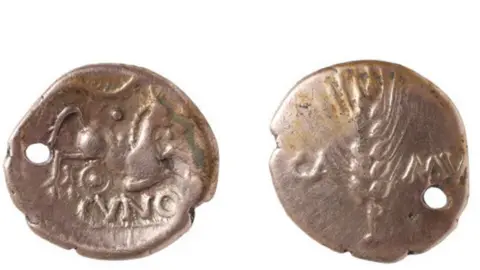Rare pierced Iron Age gold coin found in Acle declared treasure
 Norfolk County Council
Norfolk County CouncilA rare, pierced, Iron Age coin found by a metal detectorist has been declared treasure by a Norfolk coroner.
The Eastern British Iron Age gold stater of Cunobelin coin was found at Acle, Norfolk in August.
Its coppery, pale gold colour indicated it contained gold of low purity, but was an amount enough to qualify as treasure, said coroner Yvonne Blake.
The Portable Antiquities Scheme (PAS) said its database had recorded ten pierced Iron Age gold coins.
They would have been pierced for use most likely as a fob or pendant.
The coin dates between 20BC and AD10.
According to numismatist Dr Adrian Marsden, "the coins themselves aren't common; pierced ones even less so."
He said it was not clear when any of the Iron Age coins were pierced and it was possible some could have been adapted centuries later.
PAS said it would not normally expect to see a stater of Cunobelin in Norfolk, although one similar on record had been found in 1994 at Bacton, near Stowmarket, Suffolk.
Cunobelin was a king who was the ruler of a large area of south eastern Britain from roughly AD10 until he died in AD42.
Camulodunum, now known as modern Colchester, was his capital and the seat of his mint.
The coin will now be offered to a museum to purchase with any proceeds shared between the landowner and finder.

Find BBC News: East of England on Facebook, Instagram and Twitter. If you have a story suggestion email [email protected]
